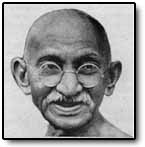|
A few weeks ago, as I was flipping through various television
channels saturated with pre-millennial hype, I came across yet
another millennium awards show, recognizing several important
events and people of the past 1000 years.
This particular show happened to be The McLaughlin Group on
PBS, hosted by the opinionated and gruff John McLaughlin, whose
obnoxious stentorian voice lured me in like a baited hook might
a helpless fish. Before I go on, a brief note about the format
used on McLaughlin's show; he invites a panel of intellectuals
to discuss a topic, after each member has given his/her grain
of salt, he tells them how regretfully wrong they all are. |
 |
In this case, after each panellist has been afforded the opportunity
to nominate a person or event in a given category, rather than
give his own personal opinion, McLaughlin would proceed to enlighten
them by furnishing the right answer. Despite the obvious frustration
caused by this method, I suppose it could be forgiven if he avoided
decisions that were so out of line as to be insulting to an individual
or group. Unfortunately, he did not.
After having "discussions" on potential winners
in several categories, McLaughlin suggested the group contemplate
the Best Military Leader of the Millennium. The issue was debated
and such people as Genghis Khan, Napoleon Bonaparte and Joan
of Ark were proposed. Arguments can certainly be made in favour
of the election of any of these famous leaders. However, Mr.
McLaughlin disagreed with all of them, deciding instead to bestow
this prestigious award on… you guessed it, Mohandas
Gandhi. Immediately, I found this to be a strange choice,
but the more I thought about it, the more it began to incense
me.
The word "military" means, according to Webster's
Encyclopedic Dictionary, "of, pertaining to or involving
the Armed Forces or warfare." By any definition, this is
exactly the kind of action that Gandhi was faithfully opposed
to. In case any proof of this fact is needed, there is plenty
of it.
Born on October 2nd, 1869, in Porbandar, India, Mohandas
Gandhi was greatly influenced by his mother's beliefs
in non-violence and vegetarianism, which led him to develop an
acute social conscience at a young age. He was admitted to the
British Bar in 1891 and two years later moved to South Africa,
where his struggles for independence from Britain and his civil
rights movement were to begin. It was during his years in South
Africa that he developed and honed his firm belief in peaceful
civil disobedience and satyagraha, which means steadfastness
in truth or "Truth-Love". He gained popularity among
fellow Indians and other Human rights activists through his participation
and leadership in pass-burning and peaceful protests against
South Africa's discrimination and apartheid policies. He was
beaten by the police, but he never raised a hand in physical
retaliation. It was during this period that he became known as
"Mahatma" -- a title of respect given to a person known
for spirituality and high-mindedness.
Upon his return to India in January 1915, Gandhi found that
he had become a national hero and he was invited by admiring
Nationalist politicians to lead independence and freedom rallies
all over the country. Among these was The Salt March: in 1930,
spurred by the taxes imposed by the British on salt, Gandhi led
60,000 Indians to the Arabic Sea where they proceeded to make
their own salt. Nearly all were jailed; however, Gandhi encouraged
his people to submit peacefully to arrest, based on the theory
that if the jails were clogged, the British would be forced to
find other solutions. This event also led to Gandhi's appeal
to fellow Indians to live simply, boycott British goods and weave
their own clothing.
Unfortunately, Gandhi's influence also had negative repercussions.
During his first months back in India, his urging of non-cooperation
with the British led many of his followers to protest violently,
which resulted in the deaths of 400 Indians. On this and several
subsequent occasions, Gandhi went on hunger strikes, knowing
that the people's love for him would bring the violence to a
halt. Perhaps the most tragic consequence occurred in 1919 when
approximately 380 peaceful demonstrators were killed by Indian
troops in the Amritsar Massacre.
Despite the many setbacks and grievances, as well as criticism,
that he endured during his lifetime, Gandhi did live to see the
birth of an independent India as well as the beginning of the
long road toward freedom and happiness which he strove for so
diligently. He did this without a shred of violence on his part,
and to suggest that he was a military leader is deeply insulting
to his tremendous legacy. |